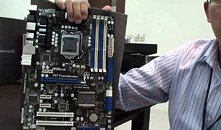- Joined
- Oct 9, 2007
- Messages
- 47,538 (7.47/day)
- Location
- Hyderabad, India
| System Name | RBMK-1000 |
|---|---|
| Processor | AMD Ryzen 7 5700G |
| Motherboard | ASUS ROG Strix B450-E Gaming |
| Cooling | DeepCool Gammax L240 V2 |
| Memory | 2x 8GB G.Skill Sniper X |
| Video Card(s) | Palit GeForce RTX 2080 SUPER GameRock |
| Storage | Western Digital Black NVMe 512GB |
| Display(s) | BenQ 1440p 60 Hz 27-inch |
| Case | Corsair Carbide 100R |
| Audio Device(s) | ASUS SupremeFX S1220A |
| Power Supply | Cooler Master MWE Gold 650W |
| Mouse | ASUS ROG Strix Impact |
| Keyboard | Gamdias Hermes E2 |
| Software | Windows 11 Pro |
ASRock is known to mix and match sockets and chipsets to come up with some interesting hybrids that give users access to latest features offered by the chipset. A recent example of this is a socket 939 motherboard based on the AMD 785G chipset (read here), which gives users of socket-939 Athlons access to a fast IGP and PCI-Express 2.0. The company's latest such innovation is the P67 Transformer. This is a socket LGA1156 motherboard, it supports existing Core i5/Core i7 "Lynnfield", and Core i3/Core i5 "Clarkdale" processors, but is based on the Intel P67 Express chipset. The board gives users access to some advanced features of the P67 chipset, but won't support LGA1155 processors.
So what's in it for you? Well, the P67 PCH embeds a PCI-Express 2.0 hub compared to P55/H55, which pack an older PCI-Express 1.1 hub. The older hub is known to heavily bottleneck devices such as USB 3.0 and SATA 6 Gb/s controllers that use only a single PCI-E lane (since PCI-E 1.1 has 250 MB/s per direction bandwidth, compared to 500 MB/s on the PCI-E 2.0). So significant is this bottleneck, that some motherboard designers even used bridge chips that convert the P55's PCI-E 1.1 x4 port to two PCI-E 2.0 x1, for USB 3.0 and SATA 6 Gb/s controllers. The PCI-E x16 slots however, are wired to the processor and are Gen 2. ASRock's board hence gives you two USB 3.0 and two SATA 6 Gb/s with an alleviated bus bottleneck.

The P67 Transformer is a standard ATX board with an LGA1156 socket, four DIMMs for dual-channel DDR3, one PCI-Express 2.0 x16 slot for graphics, three PCI-E x1, and two PCI. Storage connectivity includes two SATA 6 Gb/s, four internal SATA 3 Gb/s, eSATA. There are two USB 3.0 ports, a number of USB 2.0 ports, gigabit Ethernet, and 8 channel HD audio. ASRock claims that this board is capable of extremely high memory overclocking capabilities. It masked the rated DDR3 frequency capability on the motherboard, and is challenging you to guess it on its Facebook page. A lucky winners gets one of these boards. The P67 Transformer will be out in early December. A YouTube video related to the board can be watched here.
View at TechPowerUp Main Site
So what's in it for you? Well, the P67 PCH embeds a PCI-Express 2.0 hub compared to P55/H55, which pack an older PCI-Express 1.1 hub. The older hub is known to heavily bottleneck devices such as USB 3.0 and SATA 6 Gb/s controllers that use only a single PCI-E lane (since PCI-E 1.1 has 250 MB/s per direction bandwidth, compared to 500 MB/s on the PCI-E 2.0). So significant is this bottleneck, that some motherboard designers even used bridge chips that convert the P55's PCI-E 1.1 x4 port to two PCI-E 2.0 x1, for USB 3.0 and SATA 6 Gb/s controllers. The PCI-E x16 slots however, are wired to the processor and are Gen 2. ASRock's board hence gives you two USB 3.0 and two SATA 6 Gb/s with an alleviated bus bottleneck.

The P67 Transformer is a standard ATX board with an LGA1156 socket, four DIMMs for dual-channel DDR3, one PCI-Express 2.0 x16 slot for graphics, three PCI-E x1, and two PCI. Storage connectivity includes two SATA 6 Gb/s, four internal SATA 3 Gb/s, eSATA. There are two USB 3.0 ports, a number of USB 2.0 ports, gigabit Ethernet, and 8 channel HD audio. ASRock claims that this board is capable of extremely high memory overclocking capabilities. It masked the rated DDR3 frequency capability on the motherboard, and is challenging you to guess it on its Facebook page. A lucky winners gets one of these boards. The P67 Transformer will be out in early December. A YouTube video related to the board can be watched here.
View at TechPowerUp Main Site
Last edited:



 crazy sons of b******
crazy sons of b******


 sorry, edited.
sorry, edited.


 , everything else is great...
, everything else is great...